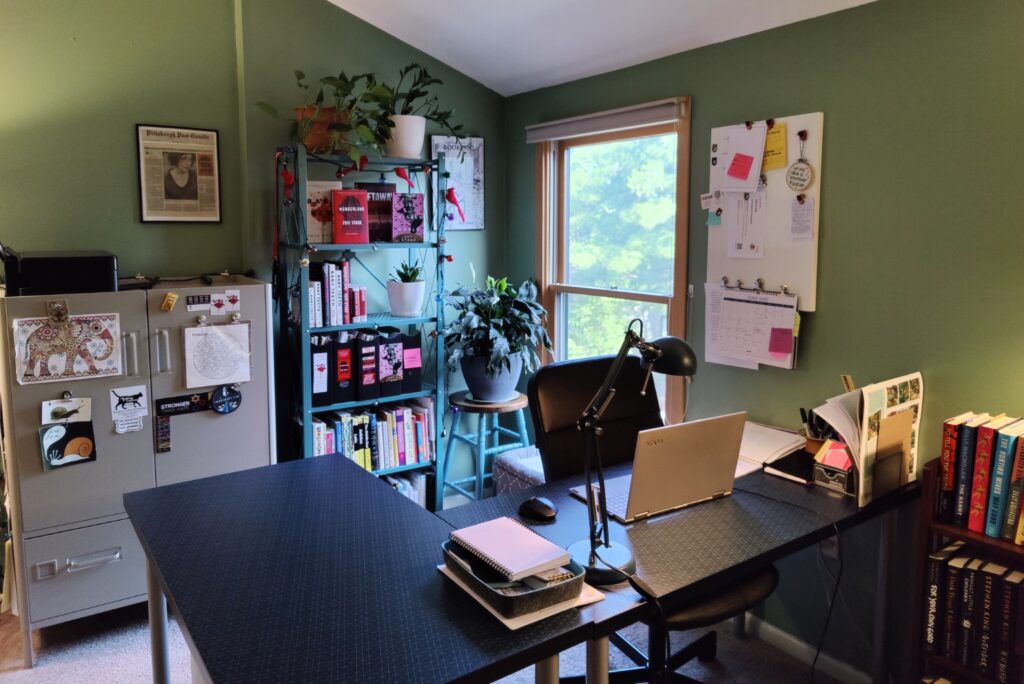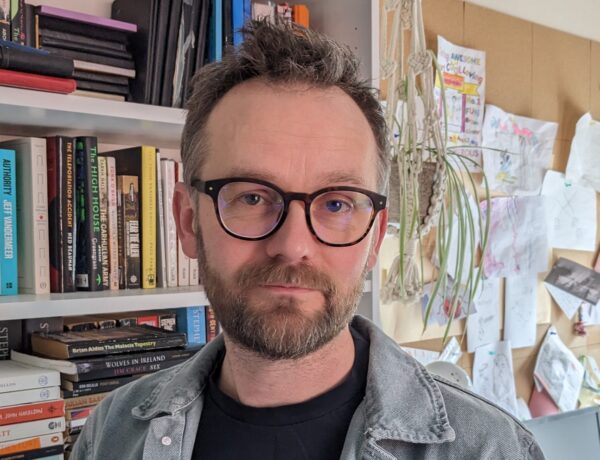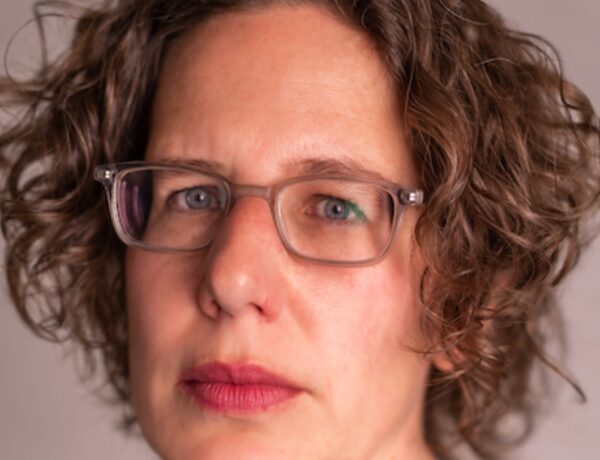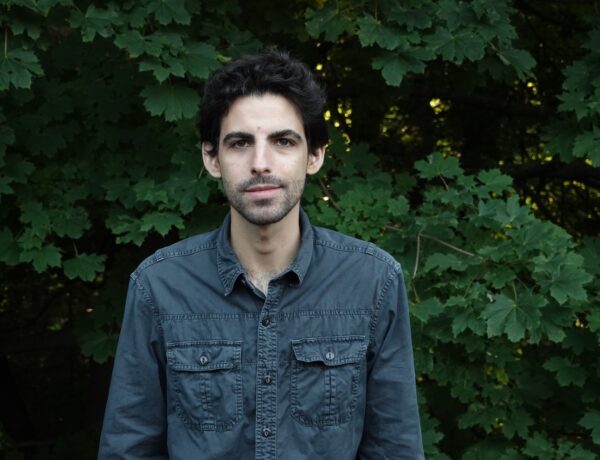Zoje Stage’s debut novel, Baby Teeth (2018), received four star reviews, was a USA Today and international bestseller, and was nominated for a Bram Stoker Award.
It is currently under option for a film adaptation by Village Roadshow/Valparaiso Pictures. Her second “mind-bending” (NY Times) novel, Wonderland (2020), was one of Book Riot’s Best Horror Books of 2020 and one of Overdrive’s Best Audiobooks of 2020. Getaway (2021), “stunning…Stage’s third triumph” (Booklist, starred review) was named by LitReactor as one of the Best Books of 2021. She lives in Pittsburgh.
Each week, we publish a new daily writing routine from a famous author. Subscribe to our newsletter so you don’t miss out!
Hi Zoje, thanks so much for joining us today. Before we get into your writing routine, can we talk a little about your writing career to date?
I was born and live in Pittsburgh (though I did some wandering to other states in my twenties, and lived in Rochester, NY for thirteen years). I started doing theatre in my teens – writing, directing, acting, running crew – I’d pretty much do anything. That fed into my passion for film and filmmaking and it was my dream for decades to be a writer/director of somewhat European inspired independent films.
When miniDV became a thing—and cameras became affordable—I made a number of DIY films, both shorts and feature-length, and screened my projects at places like Anthology Film Archives and Two Boots Pioneer Theatre in New York City, and Film Kitchen in Pittsburgh. In 2008 I won a Fellowship in Playwriting/Screenwriting from the New York Foundation for the Arts, and I was a 2012 Emerging Storytellers Fellow through the Independent Filmmaker Project.
Things started to take a nosedive in 2009 when I had a major flare-up of Crohn’s disease, which is something I’ve dealt with since I was fourteen. With my health and financial situation declining I had to make some hard decisions. I ended up on federal disability, and had to accept that filmmaking wasn’t something I could continue to do. At the start of 2013 I began writing my first novel, drawing on many of the storytelling skills I’d learned from being a filmmaker and thespian.
I don’t have much in the way of a formal education—I graduated from an alternative high school when I was sixteen—but with a few years of practice, novel-writing became the ideal outlet for my creative passions, and led to a successful career. At present I’ve published three psychological suspense novels (Baby Teeth, Wonderland, Getaway) and a novella (The Girl Who Outgrew the World), and my next novel, Mothered, will be published in Feb. 2023.
How do you think your background in theatre and filmmaking has influenced your writing career?
My background in film has definitely lent a visual awareness to my novels. I imagine scenes in my head almost as if I’m watching a movie. And I think my experience as a playwright and actor has benefitted my ability to write dialogue—though the filmmaker in me sometimes uses that sparingly.
It was tremendously helpful that I came to novel-writing having already created “full length” projects, as I had a sense of the rhythm for telling longer stories. The thought of writing novels was initially very intimidating to me, but when I considered the hats I’d worn as a filmmaker—director, photographer, editor, etc.—I realized that a novel required those elements, too. It’s been a fascinating and rewarding process to create entirely with words!
Your 2018 debut novel, Baby Teeth, received numerous accolades upon its release and became an international bestseller. The story is currently under option for a film adaptation. I’m curious what the process for this looks like and how much input you’ll ultimately have?
I think it’s fortuitous that I have a background in film, so I can take the ups and downs of the film industry in stride. Which is to say: I’m not holding my breath that there will be a Baby Teeth film any time soon. It’s the norm for bigger production companies to option the rights for significantly more material than they’ll ever produce.
At this point, Baby Teeth‘s development process has resulted in two different screenplays—and they’ve both been scrapped. I didn’t see the first script, but they sent me the second script and I had, shall we say, strong words: the adaptation didn’t resemble my novel in any way—it had a different plot, different characters, and I’d even say it was a different genre. I was glad I got to voice my issues, but Hollywood has their own way of doing things and I know ultimately it’s out of my hands.

Can you take us through the creative process behind your recently published novel, The Girl Who Outgrew the World?
Everything about The Girl Who Outgrew the World was a little different than my other projects. For starters it’s my first novella, and the first time I’ve worked with a small press. I also wrote the initial draft of it faster than any other book, and the idea coalesced in a very particular moment. I’d been toying with the idea of doing something with a “giant” girl, and then the story burst to life as I watched the Brett Kavanagh hearings.
I knew I wanted to write a fairytale—a quickly-told story with a whimsical façade that held within it a deeper and darker purpose. And the Kavanaugh hearings were a harsh reminder of the ways that society judges women, and then refuses to listen to them. It inspired the ideal parable for me to explore in my fairy tale.
What does a typical writing day look like for you?
I am not a morning person. On a typical writing day I’ll get up at 9 or 10, eat a bowl of cereal, feed the cat, watch some news, read some email, and then go back to bed for a bit. On an “early” writing day I’ll be at my desk by 1 or 2pm, where typically I will dither—more email, social media. Then I need a snack. And then, finally, I’m ready to work.
Once upon a time I didn’t edit my work as I wrote a first draft, but now I do, so I start with reading/tweaking the previous chapter or two. I find this really helps me get back into the right headspace, and then after editing I’m ready to write new material. Because of my health issues—and constant challenges with physical energy and brain fog—I tend not to work for long periods of time. But over the years I have acquired the ability to write fairly quickly, once I’m fully focused. I’ve learned not to be rigid in my expectations of how much I write per day. Of course I always want to write more, but less is better than nothing, and I always finish what I start.
I need a lot of downtime to function creatively, and I consider that down time to be an important part of my process. Maybe it’s time spent reading, or watching TV or documentaries, or tap dancing, or lying around looking as if I’m doing nothing. But for me that’s when ideas form and thoughts connect. I always have a little notebook beside me and jot down things that pop into my head. I tend to get a burst of energy at night—between ten and midnight—and maybe I’ll work on another project then (or cook a meal). I rarely go to bed before 2am, and then it all starts again.
Do you have a word count that you like to hit each writing day?
I often recommend to new (or busy) writers that they set a daily word count goal of 75 words. This is a highly achievable goal, and writing can be something of a mental game so it helps to feel victorious. I take this advice myself, though I use the 75 words as a minimum. I typically strive for closer to 500 words. Sometimes I will write quite a bit more than that, though it seems like the quality of what I write decreases if I go much beyond 1000 words.
What does your writing workspace look like?
I always like to work near a window, so I can look outside and see what’s going on. And I need a fair amount of surface space on my desk—because my cat often lies on it. (Though when I’m working she tends to prefer lying directly behind my laptop, or on top of my notebook).

Before you go…
Each week, we publish a new writing routine from a famous author. Subscribe to our newsletter so you don’t miss out!



No Comments